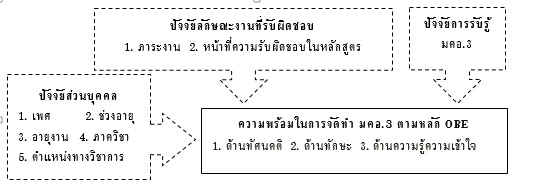Factors Affecting the Readiness in TQF3 Preparation According to OBE among Academic Staffs at Faculty of Science, Mahidol University
Keywords:
TQF3, OBE, Readiness, Recognition, Knowledge, Understanding, Attitude, SkillAbstract
This research investigated the readiness and factors affecting the readiness of course specification (TQF3) preparation according to outcome-based education (OBE) among academic staffs at the Faculty of Science, Mahidol University. The participants in this research consisted of 125 academic staff in the Departments of Mathematics, Chemistry, Biology, Biotechnology, Plant Science, and Physics. The tools used for data collection were a questionnaire and a test. The data was analyzed through descriptive statistics including frequency, percentage, mean, and standard deviation as well as inferential statistics including
T-test, One-way ANOVA, and pairwise comparison with the least significant difference (LSD) at the statistically significant level of 0.05. The research results found that academic staffs at the Faculty of Science, Mahidol University had a high level of readiness in TQF3 preparation according to OBE in skills, as well as moderate levels of readiness in attitude, knowledge, and understanding. The hypothesis tests indicated that there was no difference in the readiness in TQF3 preparation according to OBE in skills, attitude, knowledge, and understanding among individuals whose gender, age, or job responsibilities are different. In contrast, there was a difference in the readiness in knowledge and understanding at a 0.05 level of significance among individuals whose duration of employment, academic position, or some recognition factors are different. Also, there was a difference in the readiness in skills and in knowledge and understanding at a 0.05 level of significance among individuals from different departments.
References
สำนักงานคณะกรรมการการอุดมศึกษา. กรอบมาตรฐานคุณวุฒิระดับอุดมศึกษาแห่งชาติ พ.ศ.2552[อินเตอร์เน็ต].[เข้าถึงเมื่อวันที่ 10 กุมภาพันธ์2562]เข้าถึงได้จาก http://qa.siam.edu/images/form2557/tqf.pdf
ศุภชัย ยาวะประภาษ. กรอบคุณวุฒิอ้างอิงอาเซียน : โอกาสและความท้าทาย. วารสารราชภัฏสุราษฎร์ธานี. 2558; ปีที่ 2 ฉบับที่ 2: 12-13.
ASEAN University Network (AUN). Guide to AUN-QA Assessment at Programme Level Version No. 3.0 [Internet]. [2019 Feb 10]. Availablefrom:http://www.aunsec.org/pdf/Guide%20to%20AUNQA%20Assessment%20at%20Programme%20Level%20Version%203_2015.pdf
กองบริหารการศึกษา มหาวิทยาลัยมหิดล. แนวทางการพัฒนาหลักสูตรใหม่/ปรับปรุงหลักสูตร ตั้งแต่ปี พ.ศ. 2560 [อินทราเน็ต]. [เข้าถึงเมื่อวันที่ 10 กุมภาพันธ์ 2562]. เข้าถึงได้จาก https://op.mahidol.ac.th/ea/curriculum_management/#1514365676348-7cd13bc8-1908
นิตยา ปินตาวงค์. ความพร้อมของนักศึกษาที่มีผลต่อแนวคิดประชาคมอาเซียนของนักศึกษา: กรณีศึกษามหาวิทยาลัยธรรมศาสตร์ ศูนย์ลำปาง [วิทยานิพนธ์สังคมสงเคราะห์ศาสตรมหาบัณฑิต]. กรุงเทพฯ: มหาวิทยาลัยธรรมศาสตร์; 2559.
ชิดชนก ทองไทย. การรับรู้ และทัศนคติที่มีผลต่อความพร้อมในการเข้าสู่ตลาดแรงงานประชาคมอาเซียน ของนักศึกษาปริญญาโท มหาวิทยาลัยศรีนครินทรวิโรฒ [สารนิพนธ์หลักสูตรบริหารธุรกิจมหาบัณฑิต]. กรุงเทพฯ: มหาวิทยาลัยศรีนครินทรวิโรฒ; 2556
วิเชียร เกตุสิงห์. คู่มือการวิจัย:การวิจัยเชิงปฏิบัติ. พิมพ์ครั้งที่ 4. กรุงเทพฯ: โรงพิมพ์และทำปกเจริญผล; 2543.
นฤมล สุมรรคา. ปัจจัยที่มีผลต่อความพร้อมของบุคลากรทางบัญชีเพื่อรองรับประชาคมเศรษฐกิจอาเซียน : กรณีศึกษา สถานประกอบการจังหวัดสระบุรี [การศึกษาค้นคว้าอิสระหลักสูตรบริหารธุรกิจมหาบัณฑิต]. ปทุมธานี: มหาวิทยาลัยเทคโนโลยีราชมงคลธัญบุรี; 2554.
เชาวรีย์ อรรถลังรอง. การดำเนินการตามกรอบ TQF [อินเตอร์เน็ต]. [เข้าถึงเมื่อวันที่ 22 ธันวาคม
. เข้าถึงได้จาก http://www.sc.su.ac.th/knowledge/tqf.pdf
จิรณี ตันติรัตนวงศ์. TQF กับการเป็นอาจารย์มืออาชีพ.วารสารราชภัฏสุราษฎร์ธานี 2558;1:51-65.

Downloads
Published
Issue
Section
License
บทความทุกบทความที่ตีพิมพ์ในวารสารการพัฒนางานประจำสู่งานวิจัย (JPR2R) ถือว่าเป็นลิขสิทธิ์ของวารสารการพัฒนางานประจำสู่งานวิจัย คณะสิ่งแวดล้อมและทรัพยากรศาสตร์ มหาวิทยาลัยมหิดล





